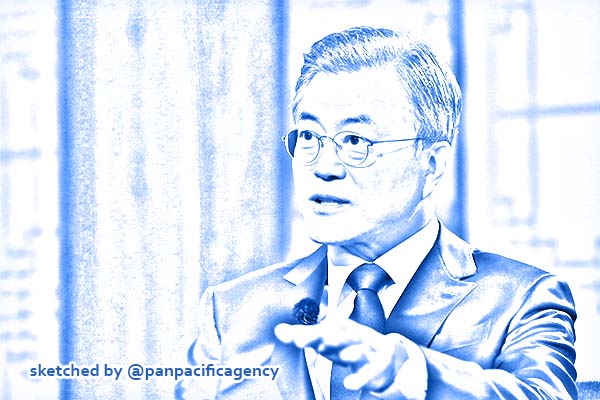[Analytics] South Korea shows how it’s done in Covid-19 era

President Moon Jae-in speaks during a live interview with public broadcaster KBS at Cheong Wa Dae in Seoul on May 9, a day before the second anniversary of his taking office. (Yonhap) Sketched by the Pan Pacific Agency.
The globe knows few better early warning systems than South Korea. William Pesek specially for the Forbes.
Its sizeable, open and tech-heavy economy often hits inflection points sooner than peers. And it should cheer policymakers, businesspeople and investors everywhere that Korea is flashing something beginning to approach green even as it turns in its worst performance in more than two decades.
The tentative language here is fully intended as Covid-19’s second and third waves unnerve leaders around the globe. The world’s biggest economy, for example, is careening toward 26 million infections alone. Roughly 850,000 Americans are applying for unemployment insurance each week. The global outlook is a complete coin toss.
Yet Korea, Asia’s No. 4 economy, is flashing some much-needed optimism about 2021. In normal times, the 1% contraction in Korean growth in 2020 would be a downer. Nowadays, it represents one of the best performances by an Organization for Economic Cooperation and Development member amid the pandemic. The fact it’s Korea gives the feat broader significance.
Korea’s export giants are riding a rising wave of demand. This jibes with dynamics boosting China, Taiwan, Vietnam, too. All of these three, it’s worth noting, did better than Korea last year. China grew 2.3%, Taiwan 1.9% and Vietnam 2.9%. Typically, though, the diversity of Korea’s export engine makes it a better showcase for Asia’s resilience during the pandemic.
On one level, all these nations prove once and for all what leaders like former U.S. leader Donald Trump got dead wrong: only by aggressively battling Covid-19 can growth return. Sadly, leaders from Washington to London are still arguing that economic growth and the coronavirus are separate challenges.
In Korea’s case, the question is whether President Moon Jae-in’s government can make the most of this moment?
Here, it’s worth noting how little investors profited from betting against Korea these last 25 years. It was the first economy to recover from Asia’s 1997-1998 crisis, and powerfully so. In 2008 amid the “Lehman shock,” traders feared Korea might be the Bear Stearns of top economies, but to no avail. In 2013, Korea avoided the “taper tantrum” shaking world markets.
Now, as Covid-19 sends the U.S., Japan and Europe reeling, Korea is once again holding its own. For now, of course. Assuming Korea won’t suffer another surge in inflections necessitating lockdowns—or that global growth won’t crash anew—Moon is still left with a reform job that’s barely begun.
When Moon took office in May 2017, he replaced President Park Geun-hye, who’d been impeached and imprisoned as part of a bribery scandal that also implicated Samsung heir Lee Jae-yong (also now in prison). Park came to office in 2013 promising to build a more innovative economy and wrestle power away from family-owned conglomerates like Samsung.
Moon replaced Park with even more ambitious plans to create a “trickle-up” system that works for everyone. Yet like Park, and her predecessor Lee Myung-bak (2008 to 2013), Moon saw the magnitude of the challenge and pivoted to other pursuits.
Understandably, epochal and disruptive reforms took a backseat to Covid-19 stimulus efforts. In December, for example, Korea’s jobless rate to an 11-year high. But Korea will pay a longer-term price for inaction in 2017, 2018, and 2019 when the economic sun was shining enough to repair leaks in the growth model. The question now is how well Moon can multitask and put some big upgrades on the scoreboard in his last 13 months in office.
One positive development: Joe Biden’s arrival in Washington. At the very least, the new U.S. president won’t intensify Trump’s trade war. Though Trump’s tariffs were mostly aimed at China, they devastated the Asian supply chains from which Korea derives the lion’s share of gross domestic product. Even better if Biden rolls back policies that did more to hurt American farmers and consumers than Xi Jinping’s hold on Chinese power.
Moon, though, needs to stop making the same mistake as predecessors: putting most of his chips on the Bank of Korea. Since December, the BOK has been under pressure to expand its mandate to support growth. Fair enough. But Moon’s economy would get more mileage from tax and regulatory changes that level playing fields to realize his vision for a “fair economy.”
That also means clamping down on the family-owned giants known as “chaebols” to make more space for a startup boom.
It will take levels of courage Moon has yet to display to roll out new anti-trust measure to reign in powerful household names like Daewoo, Hyundai, LG, Samsung and SK.
The good news is that Moon has more than a year left to act. The even better news is that his economy is flashing optimistic signs that Seoul can harness to confound the naysayers yet again. It’s kind of become Korea’s brand.
William Pesek is a Tokyo-based journalist, former columnist for Barron’s and Bloomberg and author of “Japanization: What the World Can Learn from Japan’s Lost Decades.”